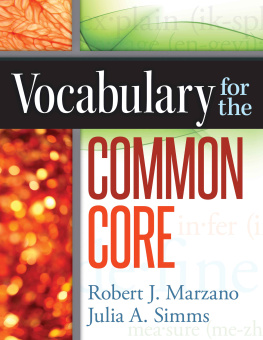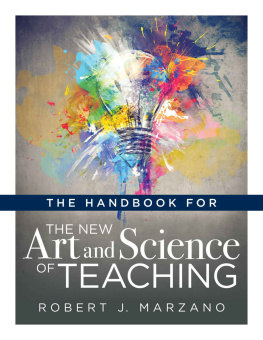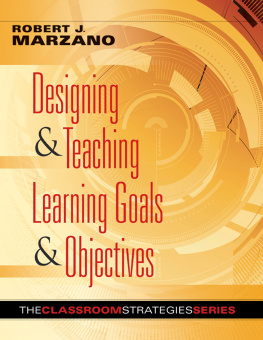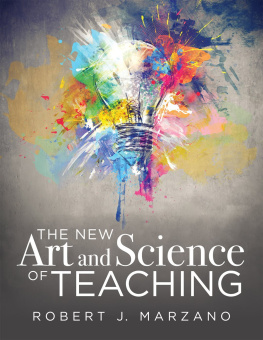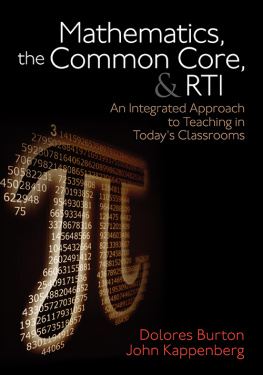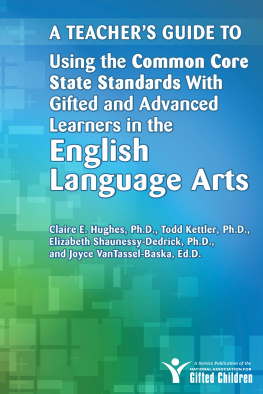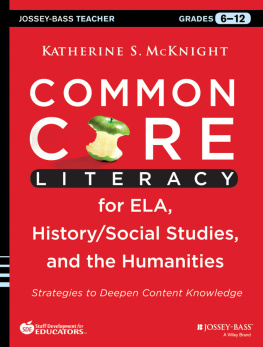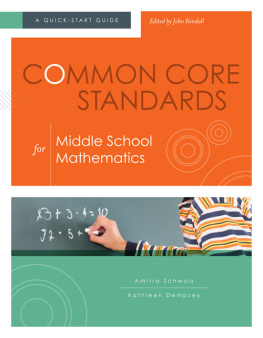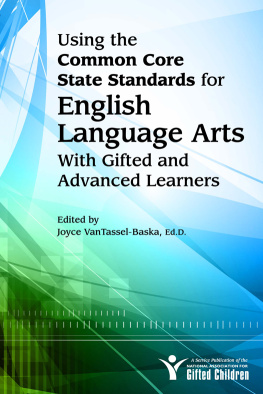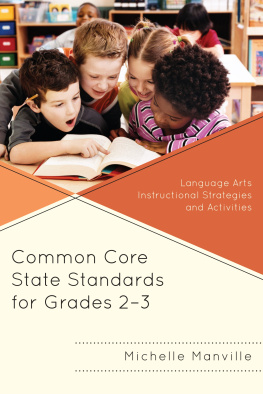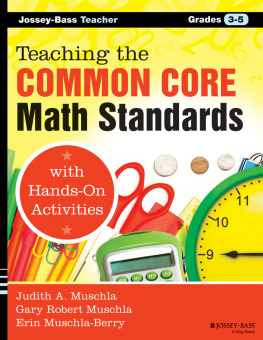Robert J. Marzano - Vocabulary for the Common Core
Here you can read online Robert J. Marzano - Vocabulary for the Common Core full text of the book (entire story) in english for free. Download pdf and epub, get meaning, cover and reviews about this ebook. year: 2011, publisher: Marzano Resources, genre: Children. Description of the work, (preface) as well as reviews are available. Best literature library LitArk.com created for fans of good reading and offers a wide selection of genres:
Romance novel
Science fiction
Adventure
Detective
Science
History
Home and family
Prose
Art
Politics
Computer
Non-fiction
Religion
Business
Children
Humor
Choose a favorite category and find really read worthwhile books. Enjoy immersion in the world of imagination, feel the emotions of the characters or learn something new for yourself, make an fascinating discovery.
- Book:Vocabulary for the Common Core
- Author:
- Publisher:Marzano Resources
- Genre:
- Year:2011
- Rating:5 / 5
- Favourites:Add to favourites
- Your mark:
- 100
- 1
- 2
- 3
- 4
- 5
Vocabulary for the Common Core: summary, description and annotation
We offer to read an annotation, description, summary or preface (depends on what the author of the book "Vocabulary for the Common Core" wrote himself). If you haven't found the necessary information about the book — write in the comments, we will try to find it.
Vocabulary for the Common Core — read online for free the complete book (whole text) full work
Below is the text of the book, divided by pages. System saving the place of the last page read, allows you to conveniently read the book "Vocabulary for the Common Core" online for free, without having to search again every time where you left off. Put a bookmark, and you can go to the page where you finished reading at any time.
Font size:
Interval:
Bookmark:
 Vocabulary for theCOMMONCORE Robert J. Marzano
Vocabulary for theCOMMONCORE Robert J. Marzano
Julia A. Simms  Copyright 2013 by Marzano Resources All rights reserved, including the right of reproduction of this book in whole or in part in any form. 555 North Morton Street Bloomington, IN 47404 888.849.0851 FAX: 866.801.1447 email: MarzanoResources.com Printed in the United States of America Library of Congress Control Number: 2013906762 ISBN: 978-0-9858902-2-3 (paperback)
Copyright 2013 by Marzano Resources All rights reserved, including the right of reproduction of this book in whole or in part in any form. 555 North Morton Street Bloomington, IN 47404 888.849.0851 FAX: 866.801.1447 email: MarzanoResources.com Printed in the United States of America Library of Congress Control Number: 2013906762 ISBN: 978-0-9858902-2-3 (paperback)



His books include The Art and Science of Teaching, Leaders of Learning, On Excellence in Teaching, Effective Supervision, the Classroom Strategies series, and Using Common Core Standards to Enhance Classroom Instruction and Assessment. His practical translations of the most current research and theory into classroom strategies are known internationally and are widely practiced by both teachers and administrators. He received a bachelors degree from Iona College in New York, a masters degree from Seattle University, and a doctorate from the University of Washington.

She is coauthor of Coaching Classroom Instruction and Using Common Core Standards to Enhance Classroom Instruction and Assessment and has led school- and district-level professional development on a variety of topics, including literacy instruction and intervention, classroom and schoolwide differentiation, and instructional technology. She received her bachelors degree from Wheaton College in Wheaton, Illinois, and her masters degrees in educational administration and K12 literacy from Colorado State University and the University of Northern Colorado, respectively. Introduction In 2009, the National Governors Association Center for Best Practices (NGA) and the Council of Chief State School Officers formed the Common Core State Standards Initiative. Their goal was to create a set of statements about what students should know and be able to do as a result of schooling that would be common to all states. Shortly after the Common Core State Standards (CCSS) were released in 2010, forty-five of the fifty states adopted them. The advent of the CCSS presents educators in the United States with new resources and opportunities, but also with significant challenges.
Teachers need to understand the ideas behind the new standards, how they differ from their states previous standards, and how to implement them in their classrooms. To help educators address these challenges, researchers at Marzano Research (since renamed Marzano Resources) sought to develop tools and strategies that educators could use to successfully implement the CCSS in their classrooms and schools. As they analyzed the CCSS and talked to teachers across the United States, they realized that vocabulary instruction was an important area of need. The CCSS prioritize students acquisition of a wide range of academic and domain-specific vocabulary, and educators needed research-based strategies and processes that would help them implement CCSS-aligned vocabulary instruction in their classrooms and schools. This book was written to meet that need. Other tools and resources for the CCSS are available in the book Using Common Core Standards to Enhance Classroom Instruction and Assessment (Marzano, Yanoski, Hoegh, & Simms, 2013) and online at MarzanoResources.com/commoncore. A book that focuses exclusively on vocabulary is not common among the many (otherwise very useful) books that have already been written about how to implement the CCSS.
Previous books have focused on the history and organization of the CCSS (Kendall, 2011; Reeves et al., 2011; Rothman, 2011), thinking skills within the CCSS (Bellanca, Fogarty, & Pete, 2012), assessments and the CCSS (Daggett, Gendron, & Heller, 2010), using the CCSS within existing instructional frameworks (Burris & Garrity, 2012; Crawford, 2012), and leading implementation of the CCSS (Dunkle, 2012). Others have offered curriculum maps for the CCSS (Common Core, 2012a, 2012b, 2012c) and strategies for achieving success with the CCSS (Silver, Dewing, & Perini, 2012). This omission is unfortunate, since the CCSS present unique demands on the breadth and depth of students vocabulary knowledge and, in turn, on the instructional techniques teachers must employ in their classrooms. For instance, while students must acquire an attitude of exploration and curiosity toward new words, teachers must identify a manageable number of CCSS vocabulary terms for direct instruction; help students understand, internalize, remember, and use those terms; and assess and track students progress with the terms. This book was written to address those challenges. explains how to build a classroom, school, or district vocabulary program and how to assess and track students vocabulary knowledge. contains the academic terms (in this case, cognitive verbs) that we identified from the CCSS, organized into twenty-four categories. contains the academic terms (in this case, cognitive verbs) that we identified from the CCSS, organized into twenty-four categories.
These verbs describe how students should interact with the knowledge and skills they learn in class. contains the domain-specific English language arts (ELA) and math terms that we identified from the CCSS, organized into 116 measurement topics (groups of related words that can be taught together). The lists all academic and domain-specific terms alphabetically with identifiers so readers can easily find specific words. PART I Vocabulary Instruction for the Common Core State Standards The Importance of Vocabulary Students vocabulary knowledge is directly tied to their success in school. This is partly because vocabulary is an important aspect of reading comprehension (Cunningham & Stanovich, 1997; Hattie, 2009; National Reading Panel, 2000; Petty, Herold, & Stoll, 1967; Scarborough, 2001; Stahl, 1999; Stahl & Nagy, 2006) and reading is an important part of learning in school. However, vocabulary knowledge helps students in other ways as well.
Knowing what words mean and how they interconnect creates networks of knowledge that allow students to connect new information to previously learned information. These networks of knowledge are commonly referred to as
Next pageFont size:
Interval:
Bookmark:
Similar books «Vocabulary for the Common Core»
Look at similar books to Vocabulary for the Common Core. We have selected literature similar in name and meaning in the hope of providing readers with more options to find new, interesting, not yet read works.
Discussion, reviews of the book Vocabulary for the Common Core and just readers' own opinions. Leave your comments, write what you think about the work, its meaning or the main characters. Specify what exactly you liked and what you didn't like, and why you think so.

